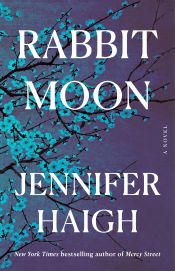Unlike Haigh’s other novels, Rabbit Moon is her first book to be set outside of the United States. While in Shanghai, Haigh spent a majority of her time writing the manuscript in public places, such as parks, teahouses, and restaurants. This allowed her to fully immerse in the environment and culture around her. Additionally, she was also able to focus solely on her writing because the languages spoken were so unfamiliar to her. She remarked, “Being out in public spaces, I could at least see people and feel life happening around me even if I couldn’t participate in it or communicate with anybody… So I think that is really what drew me out, and then what I found when I came out of my hole was so fascinating… this book is full of the kind of observation that is almost impossible to do when you’re writing about a familiar place. One of the advantages of travel is you get fresh eyes and for a writer that is a priceless thing. Also, because I could not understand [the] language, all I had was what I could observe and so it’s like losing a sense kind of sharpens your other senses in a way. I don’t know if that’s exactly true, but it felt that way.”

A novel always begins, and I think of this consciously when I’m writing, it begins with the moment after which nothing will ever be the same.”


Adoption has the dimension of connection – not only to your own tribe, but beyond, widening the scope of what constitutes love, ties, and family. It is a larger embrace.”

Podcast: Play in new window | Download
Subscribe: RSS

Want to join the discussion?
Feel free to contribute!